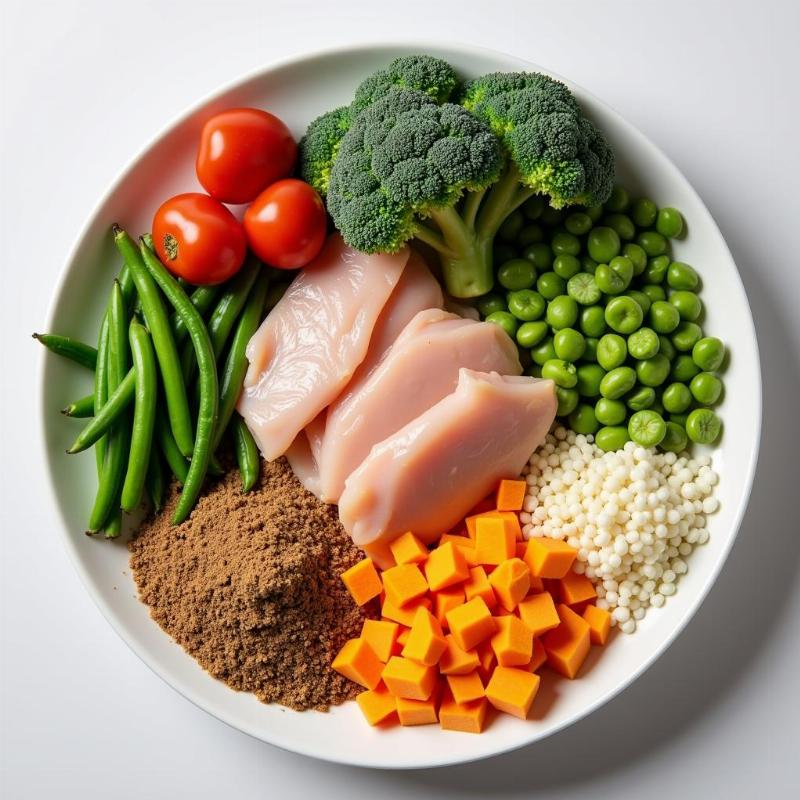Homemade dog food can be a great option for dogs with pancreatitis and diabetes, allowing owners to control ingredients and tailor the diet to their dog’s specific needs. However, formulating these diets requires careful consideration of both conditions. This article provides a comprehensive guide to creating homemade dog food for dogs managing both pancreatitis and diabetes.
Understanding Dietary Needs for Pancreatitis and Diabetes
Dogs with pancreatitis require a low-fat diet to reduce stress on the pancreas. High-fat foods can trigger painful flare-ups and worsen the condition. Diabetic dogs, on the other hand, need a diet that regulates blood sugar levels. This means avoiding simple sugars and focusing on complex carbohydrates and fiber-rich foods. Managing both conditions simultaneously requires a balanced approach that addresses both low-fat and blood sugar regulation.
Key Ingredients for Homemade Dog Food
Choosing the right ingredients is crucial. Lean protein sources like skinless chicken breast, turkey breast, and white fish are ideal. Low-fat carbohydrates like sweet potatoes, brown rice, and oats provide sustained energy without spiking blood sugar. Fiber-rich vegetables such as green beans, carrots, and broccoli help regulate digestion and blood sugar control.
 Nguyên liệu thức ăn cho chó bị tiểu đường
Nguyên liệu thức ăn cho chó bị tiểu đường
Creating a Balanced Recipe
A sample recipe might include cooked chicken breast, boiled sweet potatoes, and steamed green beans. It’s crucial to consult with your veterinarian to create a recipe tailored to your dog’s specific needs and weight. They can help ensure the diet meets all nutritional requirements and doesn’t exacerbate either condition.
Why is Homemade Food Beneficial?
Homemade food allows for complete control over ingredients, eliminating potential allergens or triggers. You can avoid artificial flavors, colors, and preservatives commonly found in commercial dog foods. This level of control is essential for managing complex health conditions like pancreatitis and diabetes.
Potential Pitfalls and Precautions
While homemade diets offer many advantages, it’s important to be aware of potential pitfalls. Nutritional deficiencies can occur if the diet isn’t properly balanced. Consult a veterinary nutritionist to ensure your recipe provides all the necessary vitamins and minerals. Supplementation may be necessary.
Transitioning to Homemade Food
Gradually transition your dog to the new diet over several days to avoid digestive upset. Start by mixing a small amount of homemade food with their current food and gradually increase the proportion of homemade food over time. Monitor your dog for any signs of digestive issues or changes in their condition.
Conclusion
Homemade dog food can be a valuable tool in managing pancreatitis and diabetes in dogs. With careful planning, consultation with a veterinarian, and meticulous preparation, you can provide your dog with a nutritious and palatable diet that supports their health and well-being. Remember, a balanced, low-fat, and blood-sugar-regulating diet is key to managing both conditions successfully.
FAQ
- Is homemade dog food always better for dogs with pancreatitis and diabetes? Not always. While it offers control, it requires careful planning and can be time-consuming. Commercial therapeutic diets are also available and can be a good option.
- What are the signs of pancreatitis flare-ups? Vomiting, lethargy, abdominal pain, loss of appetite, and fever can be signs of a flare-up. Contact your veterinarian immediately if you observe these symptoms.
- Can I give my diabetic dog treats? Treats should be given sparingly and should be low in sugar and fat. Consult your veterinarian for appropriate treat options.
- How often should I feed my dog with pancreatitis and diabetes? Smaller, more frequent meals are often recommended to help regulate blood sugar and minimize stress on the pancreas. Discuss the ideal feeding schedule with your vet.
- How do I know if my homemade diet is balanced? Consult a veterinary nutritionist. They can analyze your recipe and recommend any necessary adjustments or supplements.
- What if my dog doesn’t like the homemade food? Experiment with different ingredients and preparation methods to find something your dog enjoys. Gradual transitioning can also help.
- Can I add supplements to my dog’s homemade food? Supplements may be necessary to ensure a balanced diet. Consult with your veterinarian before adding any supplements.
Related Articles
Beautdogs.us is your leading resource for comprehensive and reliable information on dog care, breeds, and lifestyle in the US. We offer expert advice on everything from nutrition and training to grooming and health, catering to both new and experienced dog owners. Whether you’re looking for breed-specific information or general dog care tips, Beautdogs.us is your trusted source. Contact us today for personalized guidance! Email: [email protected], Phone: +1 501-555-7529.